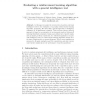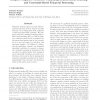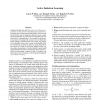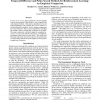458 search results - page 42 / 92 » Q-Decomposition for Reinforcement Learning Agents |
CAEPIA
2011
Springer
12 years 9 months ago
2011
Springer
In this paper we apply the recent notion of anytime universal intelligence tests to the evaluation of a popular reinforcement learning algorithm, Q-learning. We show that a general...
ICML
2004
IEEE
14 years 9 months ago
2004
IEEE
Reminder systems support people with impaired prospective memory and/or executive function, by providing them with reminders of their functional daily activities. We integrate tem...
AAAI
2007
13 years 11 months ago
2007
Imitation learning, also called learning by watching or programming by demonstration, has emerged as a means of accelerating many reinforcement learning tasks. Previous work has s...
AAAI
2007
13 years 11 months ago
2007
Reinforcement learning (RL) methods have become popular in recent years because of their ability to solve complex tasks with minimal feedback. Both genetic algorithms (GAs) and te...
ATAL
2004
Springer
14 years 2 months ago
2004
Springer
Research on coalition formation usually assumes the values of potential coalitions to be known with certainty. Furthermore, settings in which agents lack sufficient knowledge of ...




